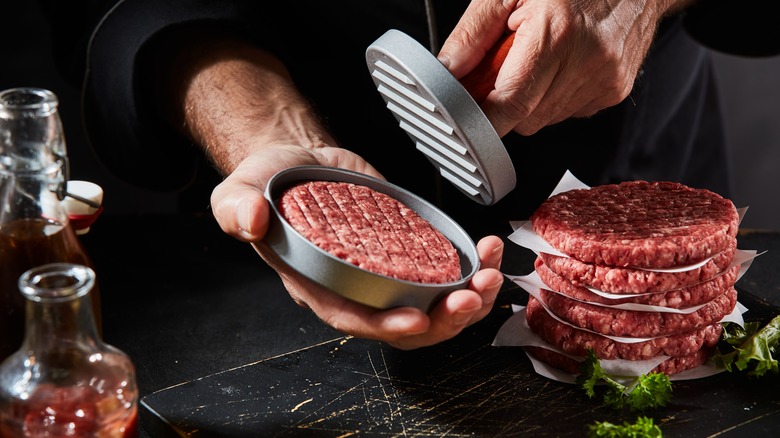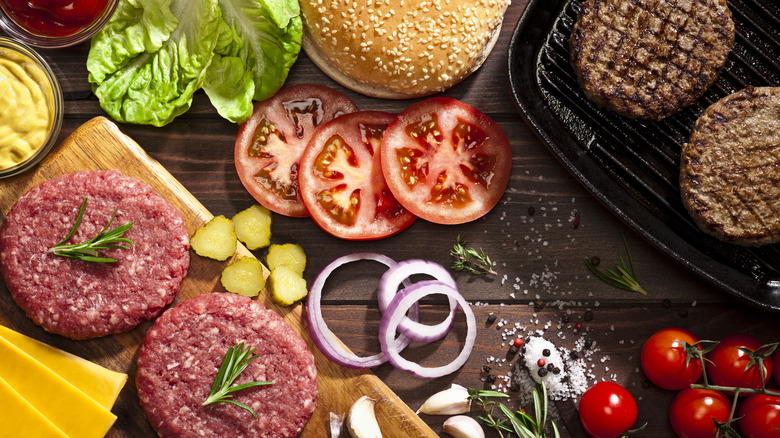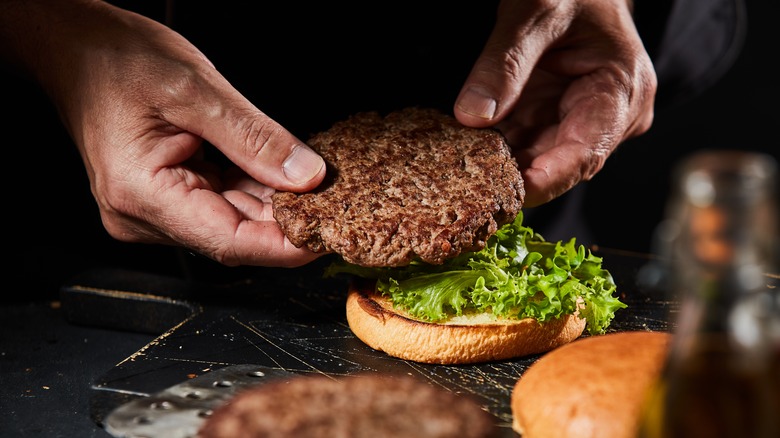The Extra Ingredients You Should Never Add To Burger Meat
A good homemade burger is a beautiful thing. Simple, succulent, and dripping with beefy juices, it's such a satisfying moment when taking that first bite out of one you've made yourself. But, if you've ever found that making burgers seems like a lot of hard work, or that the patties are dense and disappointing once cooked, then there's probably one key error you're making in the process — adding too many ingredients to the meat.
While some recipes might suggest adding diced onions, scallions, chopped herbs, breadcrumbs, or an egg to help bind the meat and add flavor, the fact is that really beef should be the sole star of any burger. Good quality meat simply doesn't need any extras. And the more mixing you do before you form the patties, the greater the risk of spoiling the texture of the finished burger, too, as over-working it means it can become tough rather than tender.
After all, you're creating a burger here, not a meatloaf sandwich. Not that there's anything wrong with making a great meatloaf sandwich, of course. But it's not the same as a burger, so step away from the extra ingredients and add-ins if you want the perfect patty next time.
Good beef doesn't need extra ingredients
Whether you're making diner-style smashed burgers, or are after a plumper patty, the focus should always be on the meat. It goes without saying that you should be using good quality beef for the best burger experience. Not only does prime meat not need any additional ingredients, being flavorsome enough already, but the simple process of adding and mixing can also be detrimental to the final texture of your burger.
The cold ground meat should be handled as little as possible when making burgers to help it stay loosely packed in the patty shape, otherwise it can break down and become mushy. Also, form the patties quickly, and if you want any extra flavors and textures, such as onions or pickles, keep them for the topping once it's cooked rather than adding them to the meat mix.
You'll want to skip adding salt to your beef, too — at least, not until after you've formed the patties, right before it hits the grill. Adding salt to the ground beef draws out water and alters the protein structures in the meat, causing it to become more tightly packed. When cooked, this can result in a burger that is dense and rubbery, more like sausage meat, rather than loosely formed and juicy, which is how a burger should be.
The best kind of beef to use for homemade burgers
If you want to make beef the star of your simple but delicious homemade all-American cheeseburger, what kind of meat should you buy? First, don't go too lean; burgers need a good degree of fat for flavor and succulence. Ideally you should be looking for a blend that's around 80% lean and 20% fat.
The meat should be coarsely ground, as a finer grind can make the texture too mushy. Since much of the pre-ground meat in supermarkets tends to be finely ground, the best bet is to ask a butcher to grind the meat for you, or do it yourself at home. You can even use a food processor if you don't have a grinder — just keep the cubes of meat well-chilled first, and give them around 10 short pulses for a medium to coarse grind.
As for the type of beef to use, 80/20 chuck, which is from the shoulder, is a good all-round bet for its flavor and combination of lean-to-fat meat. Sirloin has great flavor, but is too lean on its own, though it can be used alongside another fattier cut, as a blend, if you're grinding it yourself. Some chefs, such as Alton Brown, use an equal mix of chuck and sirloin, for balance. But whatever you're using, keep the patty simple, and save the additional ingredients for the burger toppings.



